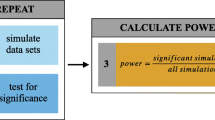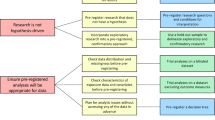Abstract
In this paper, we suggest a new method of constructing an unbiased regression type estimator in randomized response sampling. We introduce two new randomized response estimators, one we created through the utilization of a sum of special products technique and the other through the utilization of the method used for computing a matrix determinant. This new idea of making an unbiased regression type estimator proves to be more efficient with no loss in respondent protection. Analytical comparisons show the proposed unbiased regression type estimator is always more efficient than the considered competitors. The theoretical justification that the proposed estimator has a smaller variance over its competitors is crystal clear, so no simulation study is required. However to study the gain in magnitude of the relative efficiency, a simulation study has been carried out.




Similar content being viewed by others
References
Arias, R. (2019). New methods for efficient results using randomized response sampling. Unpublished M.Sc. thesis submitted to the Deaprtment of Mathematics, Texas A & M University-Kingsville.
Chaudhuri, A. (2011). Randomized response and indirect questioning technique in surveys. CRC Press, Boca Raton.
Chaudhuri, A. and Christofides, T.C. (2013). Indirect questioning in sample surveys. Springer Science & Business Media, Berlin.
Chaudhuri, A., Christofides, T.C. and Rao, C.R. (2016). Data gathering, analysis and protection of privacy through randomized response techniques: Qualitative and quantitative human traits, 34. Elsevier, North-Holland.
Fox, J.A. (2016). Randomized response and related methods, 2nd edn. SAGE, Los Angeles.
Fox, J.A. and Tracy, P.E. (1986). Randomized response: A method for sensitive surveys. SAGE, LOs Angles.
Kuk, A.Y.C. (1990). Asking sensitive questions indirectly. Biometrika77, 2, 439–442.
Mangat, N.S. and Singh, R. (1990). An alternative randomized response procedure. Biometrika 77, 2, 439–442.
Odumade, O. and Singh, S. (2009). Efficient use of two decks of cards in randomized response sampling. Commun. Stat.-Theory Methods 38, 439–446.
Warner, S.L. (1965). Randomized response: a survey technique for eliminating evasive answer bias. J. Amer. Statist. Assoc. 60, 63–69.
Warner, S.L. (1986). The omitted digit randomized response model for telephone applications. In Proceedings Survey Res. Meth. Sect Am. Statist. Assoc.. pp. 441–443.
Acknowledgments
The authors are thankful to the Editor-in-Chief Dr. Dipak K. Dey, an Associate Editor, a referee and Editorial Assistant: Mr. Sarvagnan Subramanian for their comments and help on the original version of this manuscript.
Author information
Authors and Affiliations
Corresponding author
Additional information
Publisher’s Note
Springer Nature remains neutral with regard to jurisdictional claims in published maps and institutional affiliations.
Electronic supplementary material
Below is the link to the electronic supplementary material.
Rights and permissions
About this article
Cite this article
Arias, R., Sedory, S.A. & Singh, S. An Unbiased Regression Type Estimator In Randomized Response Sampling. Sankhya B 84, 243–258 (2022). https://doi.org/10.1007/s13571-021-00256-z
Received:
Accepted:
Published:
Issue Date:
DOI: https://doi.org/10.1007/s13571-021-00256-z




